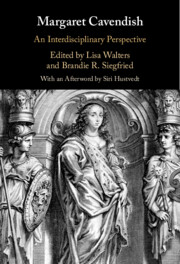Book contents
- Margaret Cavendish
- Margaret Cavendish
- Copyright page
- Contents
- Illustrations
- Notes on Contributors
- In Memoriam
- Acknowledgments
- Introduction
- Part I History of Science
- Chapter One Margaret Cavendish
- Chapter Two Margaret Cavendish Thinks about Sex
- Chapter Three Margaret Cavendish and the Rhetoric and Aesthetics of the Microscopic Image in Seventeenth-Century England
- Chapter Four Margaret Cavendish and the Nature of Infinity
- Part II Philosophy
- Part III Literature
- Part IV Politics
- Part V New Directions
- Afterword
- Chronology of Works by Margaret Cavendish
- Select Bibliography
- Index
Chapter Four - Margaret Cavendish and the Nature of Infinity
from Part I - History of Science
Published online by Cambridge University Press: 28 April 2022
- Margaret Cavendish
- Margaret Cavendish
- Copyright page
- Contents
- Illustrations
- Notes on Contributors
- In Memoriam
- Acknowledgments
- Introduction
- Part I History of Science
- Chapter One Margaret Cavendish
- Chapter Two Margaret Cavendish Thinks about Sex
- Chapter Three Margaret Cavendish and the Rhetoric and Aesthetics of the Microscopic Image in Seventeenth-Century England
- Chapter Four Margaret Cavendish and the Nature of Infinity
- Part II Philosophy
- Part III Literature
- Part IV Politics
- Part V New Directions
- Afterword
- Chronology of Works by Margaret Cavendish
- Select Bibliography
- Index
Summary
Cavendish displayed a lifelong fascination with one of the hardest of the “hard” problems, the nature of infinity. In an age which saw the birth of calculus as well as revolutionary developments in cosmology, a consistent theory of infinity was generally regarded as an illusory goal. Cavendish tackled this vexing scientific problem, which represented a radical departure from the cosmological and theological consensus of the 1660s; it anticipates a new worldview which emerged toward the end of the century, in which biblical revelation was eventually subordinated to empirical science, the Copernican hypothesis triumphed over rival theories, and the notion of a plurality of worlds became commonplace rather than shocking. From the playful speculations of the 1650s, Cavendish’s confident analysis of the nature of infinity had evolved into an essential ingredient in her prescient “theory of everything.”
- Type
- Chapter
- Information
- Margaret CavendishAn Interdisciplinary Perspective, pp. 69 - 80Publisher: Cambridge University PressPrint publication year: 2022



